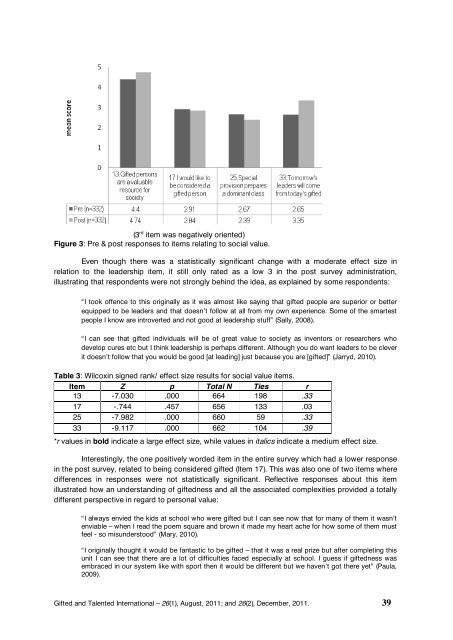The Journal of the World Council for Gifted and Talented Children
The Journal of the World Council for Gifted and Talented Children
The Journal of the World Council for Gifted and Talented Children
You also want an ePaper? Increase the reach of your titles
YUMPU automatically turns print PDFs into web optimized ePapers that Google loves.
(3 rd item was negatively oriented)<br />
Figure 3: Pre & post responses to items relating to social value.<br />
Even though <strong>the</strong>re was a statistically significant change with a moderate effect size in<br />
relation to <strong>the</strong> leadership item, it still only rated as a low 3 in <strong>the</strong> post survey administration,<br />
illustrating that respondents were not strongly behind <strong>the</strong> idea, as explained by some respondents:<br />
“I took <strong>of</strong>fence to this originally as it was almost like saying that gifted people are superior or better<br />
equipped to be leaders <strong>and</strong> that doesn’t follow at all from my own experience. Some <strong>of</strong> <strong>the</strong> smartest<br />
people I know are introverted <strong>and</strong> not good at leadership stuff” (Sally, 2008).<br />
“I can see that gifted individuals will be <strong>of</strong> great value to society as inventors or researchers who<br />
develop cures etc but I think leadership is perhaps different. Although you do want leaders to be clever<br />
it doesn’t follow that you would be good [at leading] just because you are [gifted]” (Jarryd, 2010).<br />
Table 3: Wilcoxin signed rank/ effect size results <strong>for</strong> social value items.<br />
Item Z p Total N Ties r<br />
13 -7.030 .000 664 198 .33<br />
17 -.744 .457 656 133 .03<br />
25 -7.982 .000 660 59 .33<br />
33 -9.117 .000 662 104 .39<br />
*r values in bold indicate a large effect size, while values in italics indicate a medium effect size.<br />
Interestingly, <strong>the</strong> one positively worded item in <strong>the</strong> entire survey which had a lower response<br />
in <strong>the</strong> post survey, related to being considered gifted (Item 17). This was also one <strong>of</strong> two items where<br />
differences in responses were not statistically significant. Reflective responses about this item<br />
illustrated how an underst<strong>and</strong>ing <strong>of</strong> giftedness <strong>and</strong> all <strong>the</strong> associated complexities provided a totally<br />
different perspective in regard to personal value:<br />
“I always envied <strong>the</strong> kids at school who were gifted but I can see now that <strong>for</strong> many <strong>of</strong> <strong>the</strong>m it wasn’t<br />
enviable – when I read <strong>the</strong> poem square <strong>and</strong> brown it made my heart ache <strong>for</strong> how some <strong>of</strong> <strong>the</strong>m must<br />
feel - so misunderstood” (Mary, 2010).<br />
“I originally thought it would be fantastic to be gifted – that it was a real prize but after completing this<br />
unit I can see that <strong>the</strong>re are a lot <strong>of</strong> difficulties faced especially at school. I guess if giftedness was<br />
embraced in our system like with sport <strong>the</strong>n it would be different but we haven’t got <strong>the</strong>re yet” (Paula,<br />
2009).<br />
<strong>Gifted</strong> <strong>and</strong> <strong>Talented</strong> International – 26(1), August, 2011; <strong>and</strong> 26(2), December, 2011. 39


